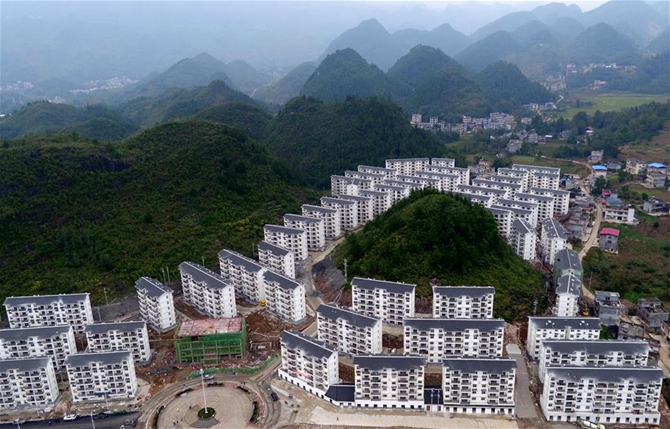
Aerial photo taken on Oct. 15, 2018 shows a view of the Songping settlement for poverty relief relocation in Shadaogou Township of Xuan'en County, central China's Hubei Province. (Xinhua/Song Wen)
At the "two sessions" -- a key annual event on China's political calendar, an even more detailed road-map for achieving the Chinese Dream of national rejuvenation has emerged.
The almost concurrent sessions of the top legislature and political advisory body every March are a time to gauge the country's development and are being closely followed, in a world seeking certainty in uncertain times.
Last year, China's economy, the second largest in the world, expanded 6.6 percent to exceed 90 trillion yuan (13.4 trillion U.S. dollars). The growth target for 2019 was set at 6-6.5 percent, showing the economy's long-term upward trend has not changed. A country of nearly 1.4 billion people is on the fast track to socialist modernization.
The accomplishment is attributed to the leadership of the Communist Party of China (CPC) Central Committee with Xi Jinping at the core and the hard work and perseverance of the Chinese people. This is the consensus of about 5,000 lawmakers and political advisors.
President Xi, also general secretary of the CPC Central Committee and chairman of the Central Military Commission, has laid out his governance priorities and shown his strategic resolve.
At the "two sessions," Xi attended plenary meetings, visited political advisors, and joined deliberations with fellow deputies to the National People's Congress.
He spoke about and gave policy instructions on a wide range of topics: maintaining resolve in environmental protection, sparing no effort to fight poverty, revitalizing the countryside, stimulating innovation and business activities, and boosting cultural confidence, among others.
These are issues crucial not only for China, but for other developing countries with the common desire to speed up modernization.
PEOPLE FIRST
Jihaoyeqiu's house perches on a hill among mountains in southwest China's Sichuan Province. The region is regarded as one of the last pockets of deep poverty in the country.
China has pledged to eliminate extreme poverty by 2020. Last year, just before the Lunar Chinese New Year, Xi came to visit Jihaoyeqiu in his ramshackle home.
That scene was captured in a photo now hanging in the living room of Jihaoyeqiu's new, 100-square-meter apartment. To his delight, Jihaoyeqiu heard his name mentioned by the president in a televised New Year Speech on the eve of 2019. "The whole family clapped and cheered," he said.
The family had been relocated out of the mountains with 100 others in the village. Life improved. Jihaoyeqiu fills his storage room with snacks and beverages as he plans to set up a convenience shop. He has had his QR code ready on the door for customers to scan for mobile transactions.
Across China, more than 13.86 million poor people crossed the poverty line last year. The country's poor population shrank from 98.99 million to 16.6 million in the past six years.
UN Secretary-General Antonio Guterres said China has contributed the most in world poverty alleviation in the past decade.
Xi is the commander-in-chief for the anti-poverty fight. He has visited every single one of the 14 poorest regions. At this year's "two sessions," he made his goal clear again: "No turning back until a resounding victory."
What China is aiming for is not just freedom from poverty for its people. Democracy, the rule of law, fairness, justice, and a good environment -- a moderately prosperous society must deliver all that the Chinese people yearn for.
Clean air, safe water and uncontaminated soil are some of the most pressing matters. Xi has taken note. He demanded strong resolve in adhering to green development even amid economic difficulties.
"Don't ever toy with the idea of sacrificing the environment for growth," Xi said when deliberating with lawmakers from Inner Mongolia Autonomous Region last week. "The ecological red line cannot be crossed."
"We must grit our teeth, climb over this slope and pass this ridge," he said regarding pollution control and prevention.
Jia Run'an, a coal chemical plant manager who deliberated with Xi at the panel, said he has come to realize that with pollution left unsolved, there would be no "moderately prosperous society."
Combating poverty, pollution and defusing major risks are called the "three critical battles." The success of these battles are key to guaranteeing a moderately prosperous society can stand the test of time.
Chinese authorities have sought to address all pressing issues that concern the people -- one-fifth of the world's population, from the environment to food and drug safety, law and order, quality healthcare, good education, and affordable housing.
Over the past year, 13.61 million urban jobs were added, 14 million people got their dilapidated houses renovated, about 80 million people were eligible for personal income tax cuts, 17 cancer drugs were included in the medical insurance program and housing prices in key cities stabilized. The list even included things like toilets.
During the "two sessions," Xi asked a rural deputy in detail how the toilet upgrading has been going in the countryside.
"Do you have flush toilets or still use pits?" Xi asked.
Deliberating with deputies from Henan Province, Xi heard village head Li Liancheng sum up the general expectations of the rural population: good schools, hospitals, jobs close to home, and a great environment.
Xi enjoys being around the people. During each of his domestic inspection tours, he visited the homes or offices of ordinary working people. He would casually appear in a crowd, stopping to speak with the people. Visiting rural areas, he would often ask people about their needs and expectations.
"Our fundamental purpose is to serve the people, focusing our efforts on meeting their aspirations to live a better life," Xi said. "The people are the foundation of the governance."
|






7740f3b5-9ecb-438e-9052-76cb2d4bb671.jpg)

